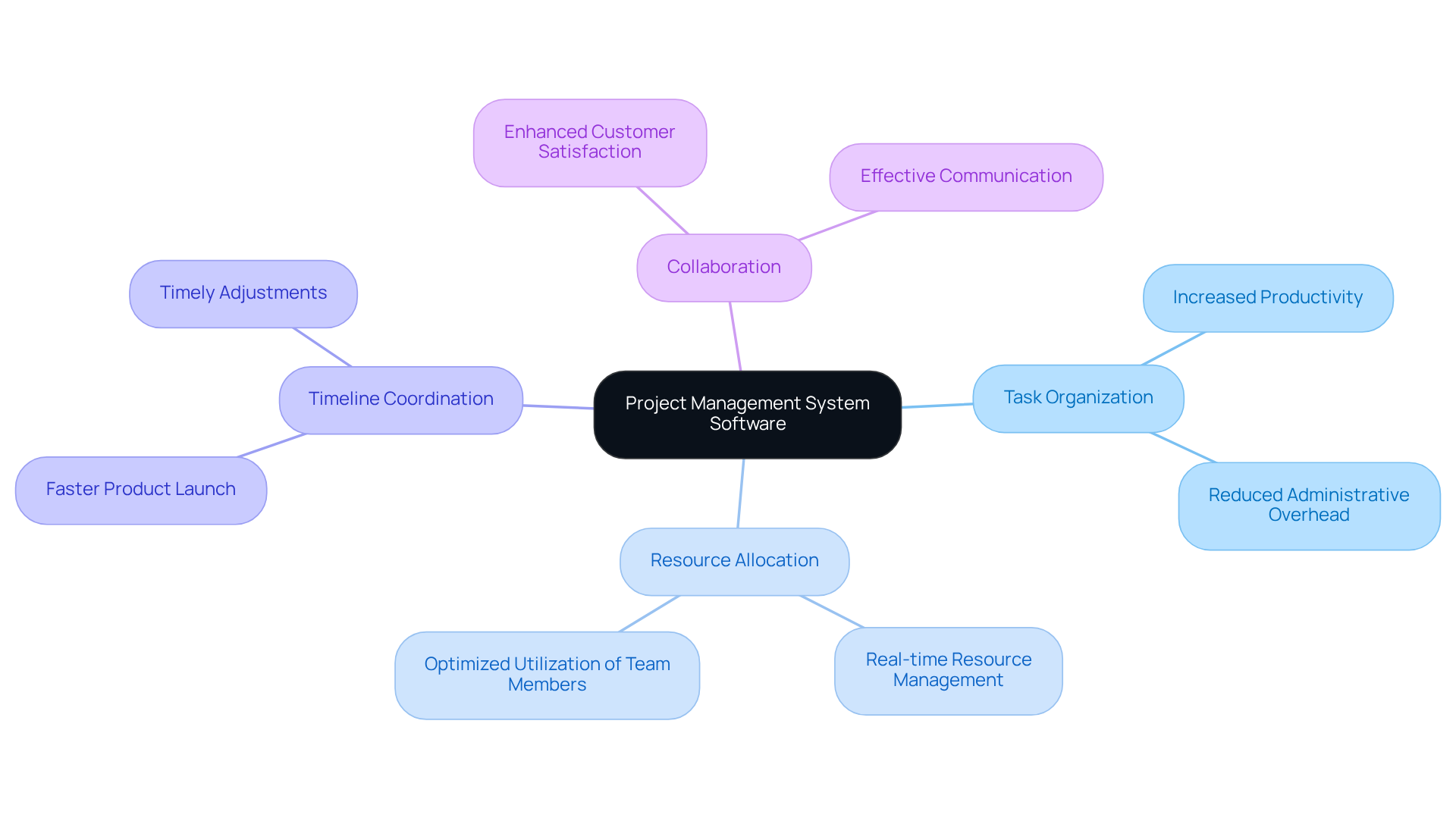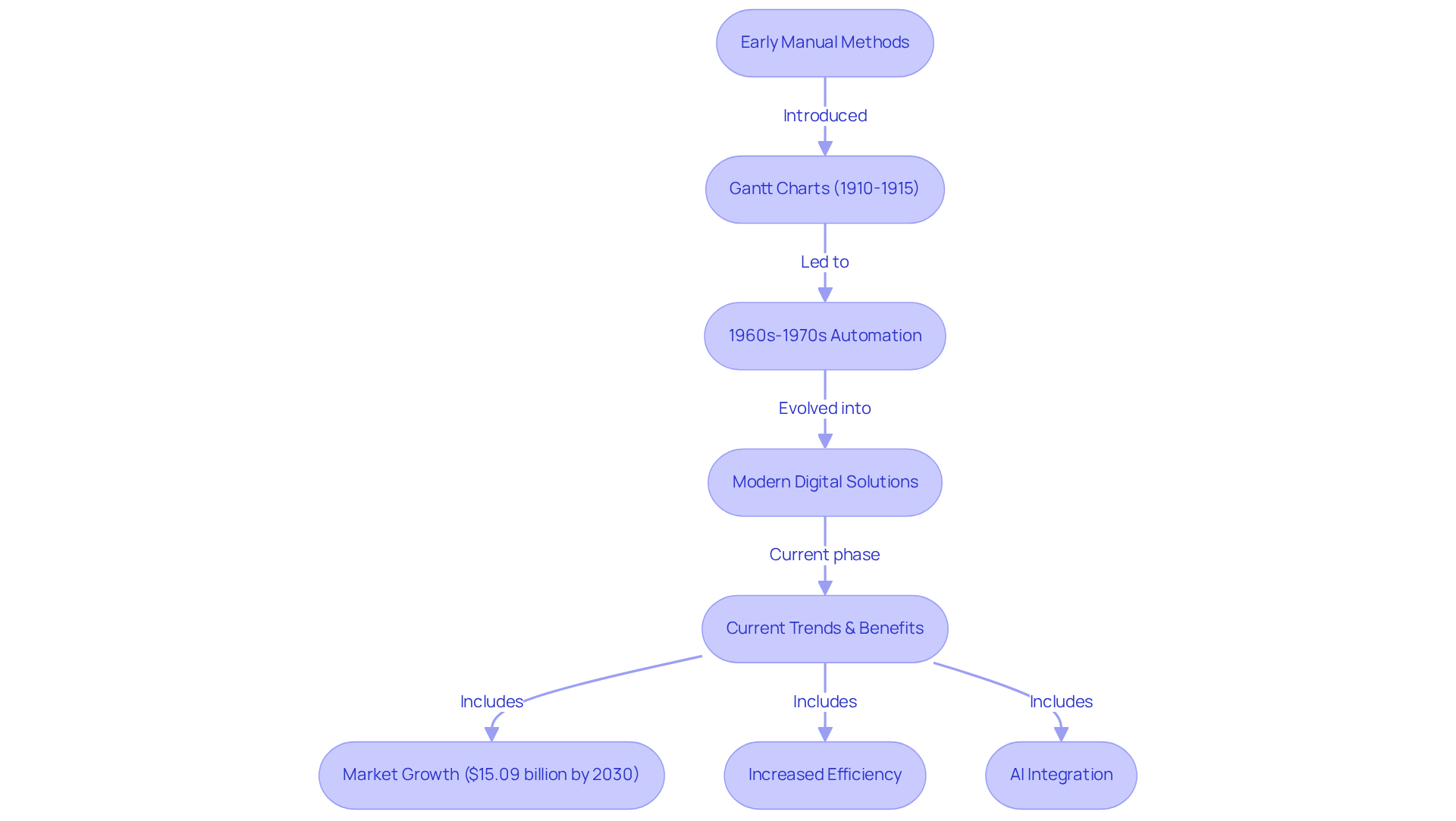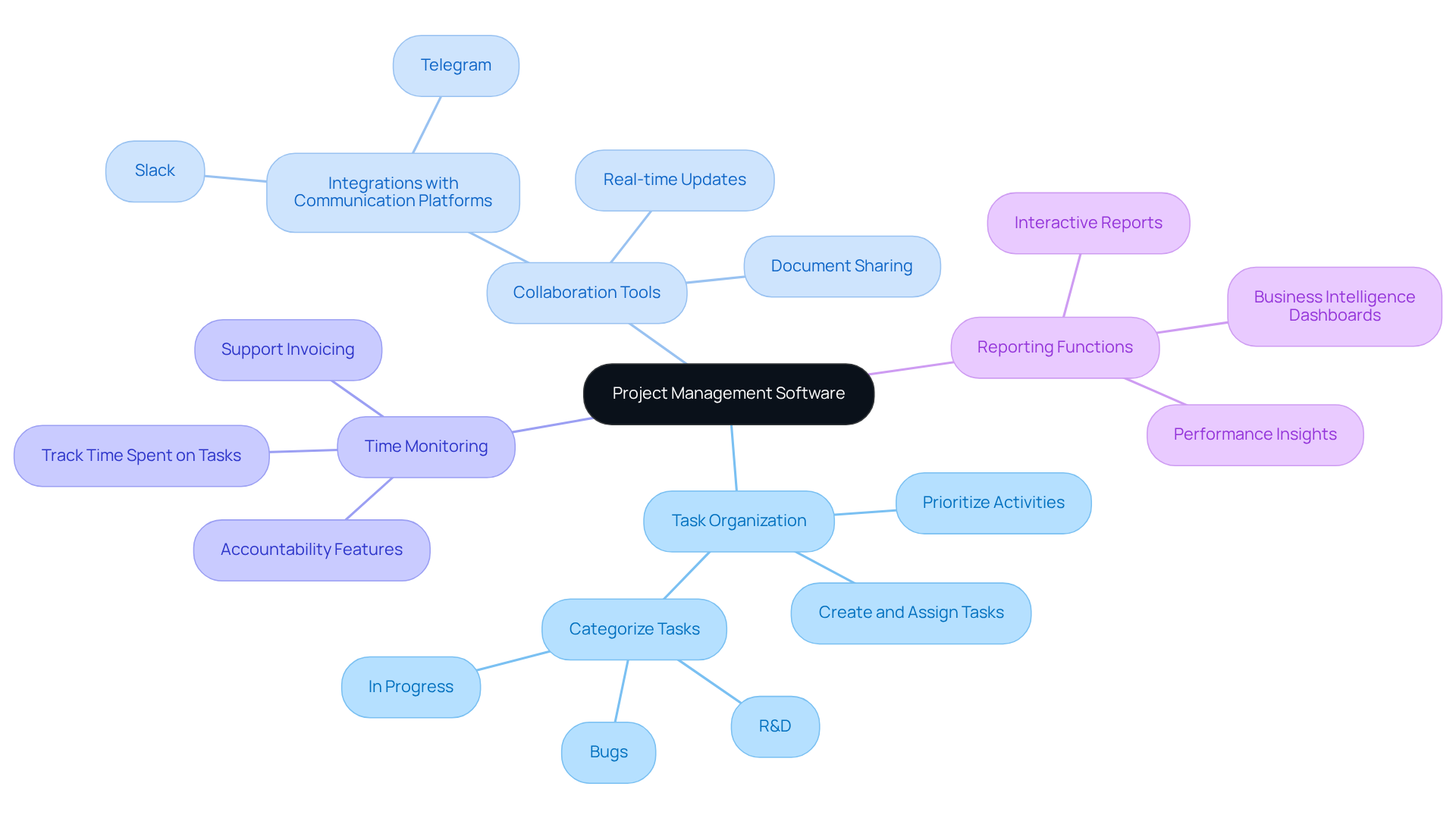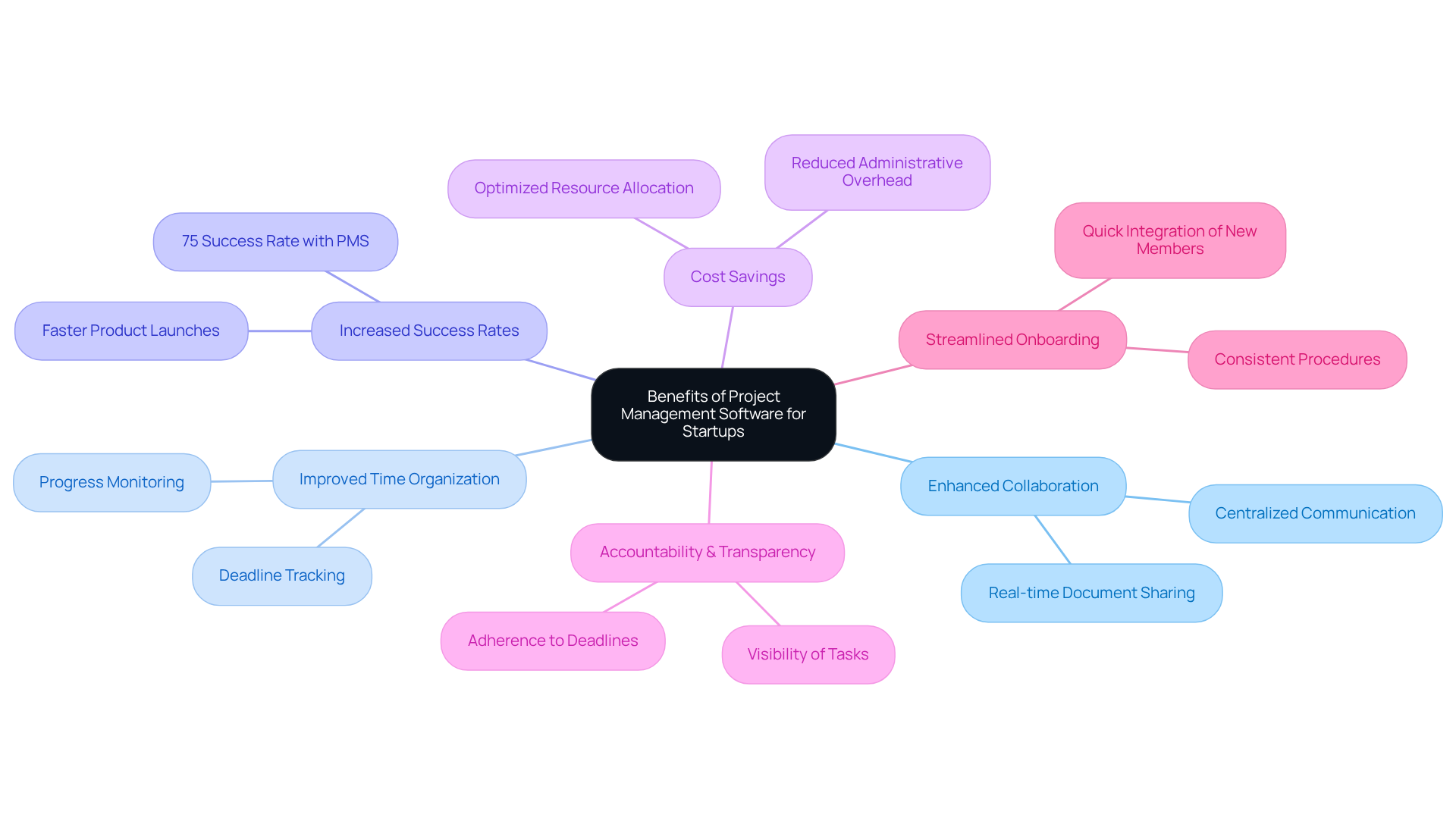Overview
This article underscores the critical role of project management system software for startups, demonstrating its capacity to enhance efficiency, foster collaboration, and drive overall success.
Consider this: startups utilizing these tools experience a remarkable 75% success rate, compared to just 56% for those that do not. Such statistics illustrate that effective task management systems are not merely beneficial but essential for navigating the myriad challenges faced by new businesses.
As you reflect on your own startup journey, ask yourself—are you leveraging the right tools to ensure your success?
Introduction
The landscape of entrepreneurship is evolving at an unprecedented pace. Startups now face mounting pressure to deliver products and services efficiently, all while navigating tight budgets and timelines. In this challenging environment, project management system software has emerged as an essential tool, enabling startups to streamline operations, enhance collaboration, and significantly boost productivity. Yet, a staggering percentage of new ventures falter due to inadequate project oversight. This raises a critical question: how can startups effectively leverage these digital tools to not only survive but thrive in a competitive market?
Defining Project Management System Software
Task organization system applications encompass digital resources that empower teams to efficiently plan, execute, and track assignments. These systems streamline task assignment, resource allocation, timeline coordination, and collaboration among team members. For new businesses, often grappling with limited resources and stringent deadlines, such applications are vital for maintaining organization and ensuring timely task completion within budget constraints. By automating various task coordination activities, these tools alleviate the administrative burden on teams, enabling them to concentrate on essential functions and foster innovation.
Significantly, new ventures utilizing task coordination software can launch products 2.5 times faster than those that do not, and those employing task coordination practices can bring products to market 28% quicker on average. This underscores the substantial impact these tools have on productivity and efficiency. As industry experts emphasize, effective oversight of initiatives is crucial for new businesses to avoid common pitfalls, with a staggering 67% of endeavors failing due to inadequate attention from overseers.
This statistic underscores the necessity of implementing a robust system for task management, which not only enhances operational efficiency but also elevates customer satisfaction through improved delivery. Therefore, establishing a strong framework for overseeing initiatives is not merely advantageous; it is essential for the success and sustainability of startups.

The Evolution and Importance of Project Management Systems
The evolution of initiative oversight has undergone a remarkable transformation since its early 20th-century origins, shifting from manual methods to advanced digital solutions. Initially, task oversight relied on paper-based systems and basic tools like Gantt charts, developed by Henry Gantt between 1910 and 1915, which provided a visual representation of timelines. The emergence of initiative coordination applications in the 1960s and 1970s represented a pivotal moment, as these tools began to automate scheduling and resource management, establishing the foundation for modern practices.
In recent years, the adoption of task coordination tools has skyrocketed, especially among startups. The global initiative oversight platform market is projected to reach $15.09 billion by 2030, driven by the growing demand for enhanced governance capabilities and increased efficiency, alongside the anticipated creation of 87.7 million new jobs in the sector by 2027. Startups, often managing multiple initiatives concurrently, gain substantial advantages from these systems, which streamline task lists and workflows, enabling teams to handle complex tasks with ease.
The significance of project management system software for managing initiatives in today's entrepreneurial landscape cannot be overstated. These project management system software enhance collaboration, streamline processes, and provide real-time insights into development progress—essential elements in the fast-paced world of new ventures. For instance, companies like SmartCoach Technologies have transitioned from chaotic communication methods to centralized task coordination tools, significantly boosting their operational efficiency by saving approximately 4 hours every two weeks. Additionally, the use of planning tools has improved communication by over 50%, underscoring their critical role in startup environments. As technology continues to advance, the integration of AI and cloud-based solutions, as exemplified by tools like ClickUp and Monday.com, is expected to further revolutionize task management, making it an indispensable asset for startups striving to thrive in competitive markets.

Key Features and Functionalities of Project Management Software
Essential aspects of software for overseeing tasks encompass task organization, collaboration features, time monitoring, and reporting functions. Task coordination empowers teams to create, assign, and prioritize activities, ensuring alignment with their objectives. But how can collaboration tools facilitate communication among team members? By integrating seamlessly with platforms like Slack and Telegram, these tools become especially advantageous for remote teams.
Research indicates that optimizing operations through management systems can significantly enhance company productivity and guarantee timely delivery of quality work. Time tracking capabilities allow for the observation of time dedicated to tasks, fostering accountability and assisting with invoicing. This, in turn, aids in improved resource distribution and planning. Moreover, robust reporting abilities provide valuable insights into performance, enabling teams to recognize bottlenecks and make informed, data-driven decisions.
Startups should focus on solutions that offer flexibility and scalability, allowing them to adapt to changing requirements while ensuring effective task oversight. Additionally, considering integrations with other tools is crucial; ignoring them can lead to implementation challenges. A modular framework in personalized solutions can facilitate effortless growth of capability oversight without considerable effort. Are you ready to elevate your task management approach?

Benefits of Project Management Software for Startups
The advantages of initiative coordination software for startups are substantial. Firstly, it enhances collaboration by providing a centralized platform for communication and task coordination. This significantly reduces the risk of miscommunication, preventing lost emails and duplication of work. Secondly, it improves time organization, enabling teams to establish deadlines and monitor progress, ensuring that tasks remain on schedule. Notably, new businesses that utilize task organization applications boast a 75% success rate compared to just 56% for those that do not. This statistic underscores the effectiveness of these tools in enhancing the performance of new ventures. Thirdly, project management system software can lead to cost savings by optimizing resource allocation and minimizing wasted time on administrative tasks. For instance, startups that implement automated task management systems, such as Casy, can significantly lower coordination costs and boost productivity. Furthermore, these tools promote accountability and transparency within new businesses, which are essential for sustaining team morale and performance. They also streamline the onboarding process for new team members, facilitating their understanding of current initiatives. Ultimately, adopting a project management system software empowers startups to operate more efficiently, adapt swiftly to changes, and concentrate on innovation.

Conclusion
Implementing project management system software is crucial for startups aiming to navigate the complexities of their early stages effectively. These digital tools not only streamline task organization and enhance collaboration but also significantly improve overall operational efficiency. By leveraging such software, startups position themselves to respond agilely to market demands while ensuring that their teams remain focused on innovation and growth.
Key insights from the discussion highlight the transformative impact of project management systems on startup success. The ability to automate tasks, improve communication, and provide real-time insights allows new businesses to avoid common pitfalls that lead to failure. Statistics reveal a stark contrast in success rates between startups that utilize these tools and those that do not, emphasizing their importance in fostering a productive work environment.
In a rapidly evolving entrepreneurial landscape, the adoption of project management software is not just a trend but a necessity. Startups should embrace these tools to enhance their project oversight capabilities, optimize resource allocation, and maintain a competitive edge. As technology continues to advance, integrating modern project management systems will be key to unlocking new levels of efficiency and innovation, ultimately paving the way for sustainable growth and success.
Frequently Asked Questions
What is project management system software?
Project management system software refers to digital resources that help teams plan, execute, and track assignments efficiently. These systems facilitate task assignment, resource allocation, timeline coordination, and collaboration among team members.
Why are task organization system applications important for new businesses?
Task organization system applications are vital for new businesses as they help manage limited resources and strict deadlines, ensuring organization and timely task completion within budget constraints.
How do these tools impact productivity and efficiency?
New ventures using task coordination software can launch products 2.5 times faster than those that do not, and those employing task coordination practices can bring products to market 28% quicker on average, highlighting their significant impact on productivity and efficiency.
What are the consequences of inadequate oversight in project management?
Inadequate oversight can lead to failure in 67% of endeavors, emphasizing the importance of effective management to avoid common pitfalls in project execution.
How does implementing a robust task management system benefit startups?
Implementing a robust task management system enhances operational efficiency and elevates customer satisfaction through improved delivery, making it essential for the success and sustainability of startups.




